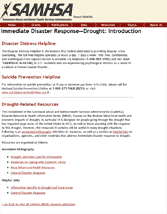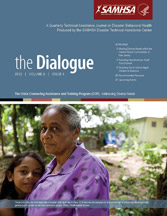On this page the Substance Abuse and Mental Health Services Administration (SAMHSA) Disaster Technical Assistance Center (DTAC) presents information on disaster behavioral health (DBH) online trainings (web-based courses), field events (DBH conferences, including meetings, workshops, and conventions), and webcasts (SAMHSA DTAC and non-SAMHSA DATC media presentations on DBH topics). If you would like to add an event to our Education and Training listing, please contact SAMHSA DTAC.
Webcasts
*New* Deployment Supports for Disaster Behavioral Health Responders Podcast
The goal of this 30-minute podcast is to prepare disaster behavioral health (DBH) responders and their family members for deployment by reviewing pre- and post-deployment guidelines and ways to prepare oneself and one's family members for the stress of deployment and reintegration into regular work and family life. This podcast aims to accomplish the following:
- Increase awareness of the unique issues DBH responders face, especially with numerous or long-term assignments.
- Provide pre-deployment guidelines to assist DBH responders and their family members as they prepare for deployment.
- Assist with the DBH responder and family members by providing post-deployment guidelines and practices that enable reintegration with family members and routine employment.
The featured speaker is April Naturale, Ph.D., of the Substance Abuse and Mental Health Services Administration (SAMHSA) Disaster Technical Assistance Center (DTAC). Dr. Naturale is a traumatic stress specialist with a 25-year history in health/mental health administration. She directed New York’s disaster mental health response following the terrorist attacks of 9/11, and spent several years in the Gulf Coast after the large-scale hurricanes that devastated the area.
SAMHSA DTAC encourages participation by behavioral health, public health, and other professionals involved in emergency management/disaster response.
If you have questions or need additional information, please contact Lori McGee at 240-515-8414 or Lori.McGee@icfi.com. Please send feedback regarding this podcast or suggestions for future podcasts or webinars to dtac@samsha.hhs.gov.
*NEW* Cultural Awareness: Children and Youth in Disasters Podcast
The goal of this 60-minute podcast is to assist disaster behavioral health responders in providing culturally aware and appropriate disaster behavioral health services for children, youth, and families impacted by natural and human-caused disasters. The podcast aims to accomplish the following:
- Define cultural awareness
- Demonstrate the importance of cultural awareness in disaster services, particularly with children and youth
- Identify common reactions of children to disaster and trauma
- Present helpful approaches to working with children impacted by a disaster
Featured speakers include April Naturale, Ph.D., of SAMHSA DTAC and Russell T. Jones, Ph.D., of Virginia Tech University. Dr. Naturale is a traumatic stress specialist with a 25-year history in health/mental health administration. Dr. Jones is a Professor of Psychology at Virginia Tech University and a clinical psychologist who specializes in trauma psychology in the areas of natural and technological disasters as well as interpersonal violence.
SAMHSA DTAC encourages participation by behavioral health, public health, and other professionals involved in emergency management/disaster response activities who are interested in learning more about working with children and youth following a disaster or need a refresher about the disaster response issues specific to this population. View archived podcasts.
*NEW* Self-Care for Disaster Behavioral Health Responders Podcast
SAMHSA Disaster Technical Assistance Center (DTAC) is pleased to present the Self-Care for Disaster Behavioral Health Responders podcast. The goal of this 60-minute podcast is to provide information, best practices, and tools that enable disaster behavioral health (DBH) responders and supervisors to identify and effectively manage stress and secondary traumatic stress through workplace structures and self-care practices. The podcast will do all of the following:
- Define the stressors unique to DBH responders, including secondary traumatic stress
- Present best practices in self-care for DBH responders
- Provide tools that can be used to promote self-care
- Identify supports that can be provided by supervisors and management to assist DBH responders
Featured speakers include April Naturale, Ph.D., of SAMHSA DTAC and Jeannette David, Georgia Disaster Behavioral Health Coordinator.
SAMHSA DTAC encourages participation by behavioral health, public health, and other professionals involved in emergency management/disaster response and interested in learning more about self-care best practices. View archived podcasts.
Promising Practices in Disaster Behavioral Health Planning Webinar Series
From June to August 2011, SAMHSA DTAC held the Promising Practices in Disaster Behavioral Health Planning webinar series that consisted of nine webinars addressing promising practices in integrated mental health and substance abuse DBH planning. These webinars are meant to assist State and Territory disaster behavioral health coordinators, disaster mental health coordinators, and disaster substance abuse coordinators, as well as emergency management/behavioral health coordinators for Tribes, with the development and implementation of their DBH plans. The webinars have been recorded and are currently available for viewing. View archived Promising Practices webinars.
SAMHSA DTAC encourages all States, Territories, and Tribes to view the recorded webinars. If you have any questions, please contact Ms. Terri Spear (Emergency Coordinator, SAMHSA/Office of Policy, Planning and Innovation/Division of Policy Innovation) at 240-276-2244 or terri.spear@samhsa.hhs.gov or Dr. Amy Mack (SAMHSA DTAC Project Director) at 240-744-7090 or amy.mack@icfi.com.
Building Awareness of Disaster Behavioral Health Webinar Series
In July and August 2011, SAMHSA DTAC held the Building Awareness of Disaster Behavioral Health webinar series to educate participants about the mental health, substance abuse, and stress management needs of people who have been exposed to human-caused, natural, or technological disasters. The webinars also help to build awareness about preparedness and response efforts in this area. The content of the webinars can be utilized by mental and non-mental health professionals who are involved in emergency management/disaster response and interested in learning more about mental health and substance abuse issues. The webinars featured nationally known mental health and substance abuse experts, as well as representatives from the fields of public health and emergency management. The webinars have been recorded and are currently available for viewing. View archived Building Awareness webinars.
Non-SAMHSA DTAC Webcasts
| Topic | Date / Time Aired |
|---|---|
Cultural Competency and Disaster Mental Health |
January 16, 2008 |
Disaster Mental Health Counseling Podcast |
Date and time unknown |
Safe Schools: Crisis Intervention; How to Support People Coping with Loss |
March 16, 2010 |
Safe Schools: Behavioral Health Recovery After Crisis Situations |
December 16, 2008 |
State of All Hazards Preparedness for Children: Partnerships and Models for Merging Emergency Department and Disaster Preparedness Efforts Nationwide |
March 24, 2010 |
Stress Management for Emergency Responders—What Agencies Can Do |
January 21, 2009 |
Online Training Sites
Early Responders Distance Learning Center ![]()
The Early Responders Distance Learning Center created and administers accredited courses for the emergency response community on preparing and responding to terrorist incidents with a specialized focus on psychological consequences.
Federal Emergency Management Agency (FEMA) Online Courses
FEMA offers free independent study courses that can be completed for continuing education units. Courses cover topics such as emergency preparedness, developing and managing volunteers, and the Incident Command System.
John Hopkins Public Health Preparedness Programs: Mental Health Preparedness Trainings ![]()
The John Hopkins Preparedness and Emergency Response Learning Center has developed a variety of mental health preparedness trainings that are available online:
- Disaster Mental Health Intervention
- Disaster Mental Health Planning
- Introduction to Mental Health and Disaster Preparedness
- Mental Health Consequences of Disaster
- Psychological First Aid Competencies for Public Health Workers
- Psychology and Crisis Response
- Psychology of Terrorism
- Roots of Terrorism
- Self-Care
The National Child Traumatic Stress Network (NCTSN) Psychological First Aid (PFA) Online Course ![]()
The NCTSN Learning Center is an online training center geared toward professionals and families seeking to learn more about child traumatic stress. Many resources specifically focus on disaster-related trauma and grief. The NCTSN Learning Center also features the PFA 6-hour interactive course in which the student plays the role of a provider working in a scene after a disaster. According to the online course description, “This professionally narrated course is for individuals who are new to disaster response and want to learn the core goals of PFA, as well as for seasoned practitioners who want a review. It features innovative activities, video demonstrations, and mentor tips from the nation’s trauma experts and survivors. PFA Online also offers a Learning Community where participants can share experiences of using PFA in the field, receive guidance during times of disaster, and obtain additional resources and training.”
Field Events
National Emergency Management Association 2012 Emergency Management Policy & Leadership Forum ![]()
http://www.nemaweb.org/index.php?option=com_content&view=article&id=96&Itemid=211 ![]()
October 5–9, 2012; TBD
The purpose of this conference is to provide a forum where experts and professionals in emergency management can discuss concerns in their field, policy development, and legislative issues.
Dynamics of Preparedness Conference ![]()
https://midas.pitt.edu/index.php?option=com_content&view=article&id=269&Itemid=474 ![]()
October 22–24, 2012; Pittsburgh, PA
The Dynamics of Preparedness Conference will provide a forum for researchers in many fields to discuss the future of research on preparedness for emergencies within public health systems.
International Association of Emergency Managers (IAEM)-USA 60th Annual Conference ![]()
http://www.iaem.com/events/annual/intro.htm ![]()
October 26–November 1, 2012; Orlando, FL
The IAEM-USA Annual Conference will provide training workshops and breakout sessions on the conference theme "Resiliency: Building a Better Tomorrow" and will focus on the following topics:
- Long-term recovery and mitigation
- Mission continuity
- Emerging technologies
- Case studies
- Partners in practice—emergency management community
American Public Health Association 140th Annual Meeting and Exposition ![]()
http://www.apha.org/meetings/AnnualMeeting/ ![]()
October 27–31; San Francisco, CA
The purpose of this conference is to unite the public health community in order to enhance their knowledge and support exchange of information on best practices, latest research, and new trends in public health.
Global Conference on Disaster Management ![]()
http://www.disasterconference.org/index.php/conferences ![]()
November 8, 2012; Los Angeles, CA
This conference will provide a forum on disaster management research; disaster preparedness; business continuity; emergency management, communications, and response; risk management; security; information technology; and human resources, environmental services, community planning, and the organizations that supply and serve these professions.
Disaster Management Conference 2012![]()
http://www.gov.mb.ca/emo/general/conference/index.html![]()
November 7–9, 2012; Winnipeg, Manitoba, Canada
The purpose of this conference is to provide a forum for emergency preparedness planners, health professionals, first responders, elected officials, educators, and policymakers to share experiences, showcase technologies, and provide information on and solutions to problems in emergency management.
The International Disaster Conference and Exposition ![]()
http://www.internationaldisasterconference.com/ ![]()
January 8–10, 2013; New Orleans, LA
The purpose of this conference is to bring together professionals in public and private sectors to discuss disaster recovery, lessons learned from responding to disasters, and best practices.
12th World Congress on Stress, Trauma, and Coping ![]()
http://www.icisf.org/world-congress/12th-world-congress ![]()
February 19–24, 2013; Baltimore, MD
The purpose of this conference is to give those who provide crisis and disaster mental health services an opportunity to discuss research on and innovations in crisis intervention, as well as crisis intervention in the following contexts: military, disaster response, emergency services, health care, work with special populations, and schools.
Last updated 09/05/2012
DTAC Quick Links
- FacebookExternal link. Please review our Disclaimer
- FlickrExternal link. Please review our Disclaimer
- RSS FeedsExternal link. Please review our Disclaimer
- SAMHSA BlogExternal link. Please review our Disclaimer
- TwitterExternal link. Please review our Disclaimer
- YoutubeExternal link. Please review our Disclaimer
Immediate Disaster Response: Drought-Disaster Behavioral Health Information Series (DBHIS)
This Substance Abuse and Mental Health Services Administration (SAMHSA) DBHIS installment focuses on the disaster behavioral health and economic impacts of drought. In particular it is designed for people going through the drought that has impacted large areas of the United States in 2012, as well as those assisting with the response to this drought.
The Dialogue Volume 8: Issue 4
In this issue of The Dialogue, we have asked current Crisis Counseling Assistance and Training Program (CCP) staff to share their experiences from recent disasters. Each brought a different perspective and highlighted how his or her team had adapted their CCP to meet the needs of a particular community. We appreciate their efforts to do so in the midst of disaster response and hope that you find their articles informative as well as inspiring.





